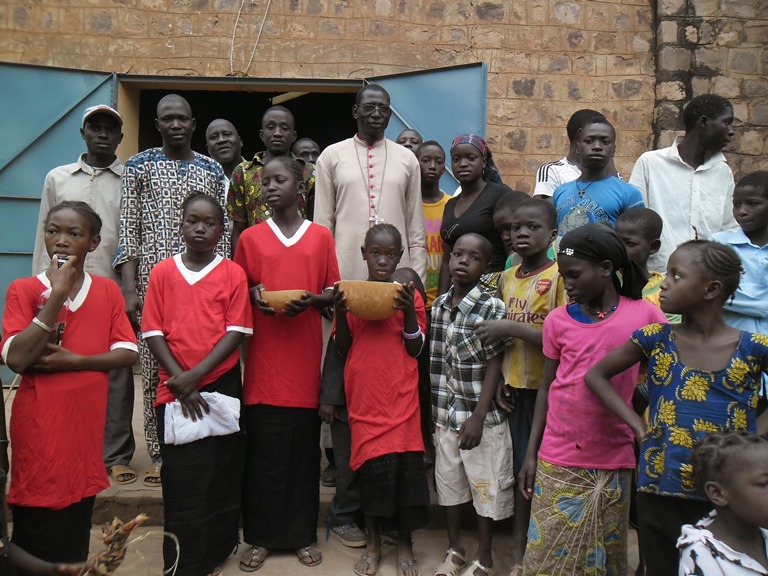|
Mali: 'To secure peace we must start with our own family.'
Thursday, July 6, 2017
"In two or three places on the border to Burkina Faso Christian communities have already been prevented from gathering for Mass."
In 2012, a military coup plunged the West African nation of Mali into
chaos as jihadist militants threatened to overrun the nation. France troops
restored order, particularly in the country’s south, with the north of Mali
remaining fragile despite a peace agreement between the government and rebel
forces. To bolster the local Church, Pope Frances last month named Archbishop
Jean Zerbo of Bamako the nation’s first cardinal. In an interview with international
Catholic charity Aid to the Church in Need, Bishop Jonas Dembélé of Kayes discussed the situation in
his nation.
By Olivier Labesse
How stable do you think the situation is in Mali
following the most recent clashes between government troops and rebels in Bamako
and Timbuktu?
Peace in Mali is still not secure but the events
which are convulsing the do not affect people's everyday existence. There have
been isolated attacks but this has not paralyzed daily life. In my diocese of Kayes
in the west of Mali we lead a normal life and the priests are not under threat.
Muslims and Christians are still engaged in a dialogue there, as they are in
the rest of the country. The exceptions here are Kidal, Gao and Timbuktu, where
priests cannot freely enter. Apart from this, our missionary work can carry on
as usual elsewhere in the country.

So in Mopti the Christians cannot freely follow
their faith?
No, in Mopti life was already complicated for Christians
in back 2013 and today Islamists even attack Muslims. In Gao on the other hand the
faithful manage to hold Mass. But without priests, since these are refused
access to the city.
In two or three places on the border to Burkina Faso
Christian communities have already been prevented from gathering for Mass. This
has been done by stopping them from ringing the bells and forcing them to close
the church.
What is the relationship between the Church and
the Malian government?
As ever the Church maintains good relations with
government. It has committed itself energetically to the matter of schools, the
health system and sustainable development. The population has responded
positively to this because our efforts benefit without exception the entire
population of Mali. The government has always sought collaboration with the
Church and the bishops' conference.
Mali is a secular republic. But certain groups
are still clearly trying to establish an Islamic state.
That's true. It's repeatedly stated that the Muslims
represent the majority in Mali. And since we live in a democracy some people
want to exploit this fact, on the principle: "We are the majority and why
should we remain in a secular state when Muslims make up 95 percent of the
Malian population?" But Mali decided on the separation of religion and
state a long time ago. This decision didn't come from the Christians or
adherents of the traditional religions. Although they are Muslims, even the
Malian intellectuals know that in the modern-day world secularism is the essential
condition for a more peaceful co-existence. But the politicians sometimes succumb
to the temptation to orient themselves too much according to the interests of
certain groups on whose votes they depend.
Has the Church traditionally had a good
relationship with the Muslims?
Mali has offered an example of a
well-functioning dialogue between Christians and Muslims for the whole of West Africa.
But the Malian form of Islam is a more tolerant one. This is continuing but
since 2008 we have been observing a gradual Arabization of Islam, and this
makes the situation overall more difficult. In the villages you normally
encounter families which include Christians, Muslims and adherents of the
traditional religions. Unfortunately we can see today the growth of certain
intolerant groups.
How do you assess the future of Mali? How can
peace be established?
There is cause for hope. We are trying to make
people aware of the fact that, if we wish to create peace, we will first have
to start the process in our own families. Only then will we be able to continue
with our efforts in our districts, villages and regions to enable peace to
spread throughout the country. We also call on politicians to focus in
particular on welfare of Malians and to give priority to the common good over
the interests of individual groups who do not have peaceful intentions. There
are individuals of good will who are already working in this direction with the
support of the international community and the Economic Community of West
African States. There are signs of improvement, but the process will take time.
Bishop Jonas Dembélé among his people; ACN photo
|